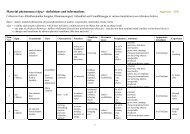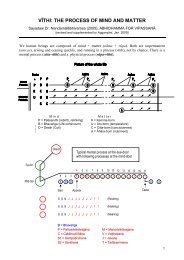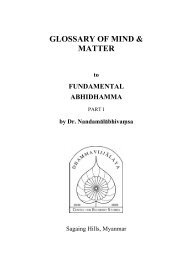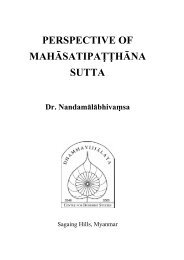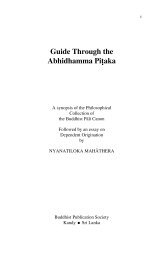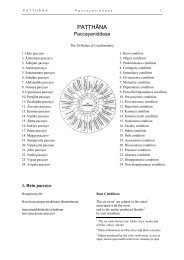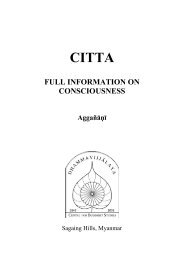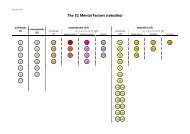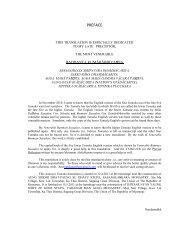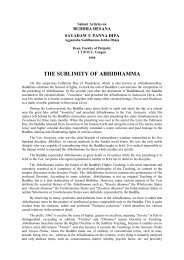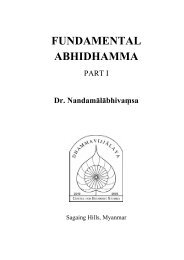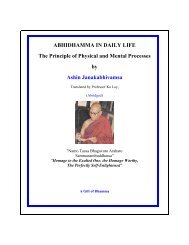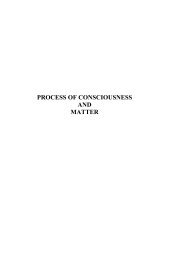Mahathera Ledi Sayadaw - Abhidhamma.com
Mahathera Ledi Sayadaw - Abhidhamma.com
Mahathera Ledi Sayadaw - Abhidhamma.com
You also want an ePaper? Increase the reach of your titles
YUMPU automatically turns print PDFs into web optimized ePapers that Google loves.
Nakhasikha Sutta<br />
"At one time the Buddha, showing them some dust which he had taken upon the tip of his fingernail,<br />
addressed the disciples thus: 'If, O Bhikkhus, these few grains of dust upon my finger-nail<br />
and all the dust in the universe were <strong>com</strong>pared in quantity, which would you say was less, and<br />
which more' The disciples replied: 'Lord, the dust on your finger- nail is less, and that of the<br />
universe is more. Surely, Lord, the dust on your finger-nail is not worthy of mention in<br />
<strong>com</strong>parison with the dust of the universe.' Then the Buddha continued; 'Even so, Bhikkhus, those<br />
who are reborn in the abodes of men and Devas whence they have expired, are very few even as<br />
the few grains of dust on my finger-nail; and those who are reborn in the four realms of misery are<br />
exceedingly many, even as the dust of the great universe. Again, those who have expired from the<br />
four miserable worlds and are reborn in the abodes of men and Devas are few even as the grains<br />
of dust on my finger-nail; and those who are repeatedly reborn in the four miserable worlds are<br />
innumerable, even as the grains of dust of the great universe."<br />
What has just been said is the substance of the Nakhasikha Sutta. But, to say nothing of the beings<br />
of all the four realms of misery, the creatures that inhabit the four great oceans alone will suffice<br />
to make evident how great is the evil of Vinipatana-gati, that is, the dispersion, the variety of<br />
possible kinds of existence after death.<br />
Kanakacchapa-Sutta:<br />
"At one time, the Buddha addressed the disciples thus: 'There is, O Bhikkhus, in the ocean a<br />
turtle, both of whose eyes are blind. He plunges into the water of the unfathomable ocean and<br />
swims about incessantly in any direction wherever his head may lead. There is also in the ocean<br />
the yoke of a cart which is ceaselessly floating about on the surface of the water, and is carried<br />
away in all directions by tide, current and wind. Thus these two go on throughout an incalculable<br />
space of time: perchance it happens that in the course of time the yoke arrives at the precise place<br />
and time where and when the turtle puts up his head, and yokes on to it. Now, O Bhikkhus, is it<br />
possible that such a time might <strong>com</strong>e as is said' 'In ordinary truth, O Lord,' replied the Bhikkhus<br />
'it is impossible; but time being so spacious, and an aeon lasting so long, it may be admitted that<br />
perhaps at some time or other it might be possible for the two to yoke together, as said; if the<br />
blind tortoise lives long enough, and the yoke does not tend to rot and break up before such a<br />
coincidence <strong>com</strong>es to pass.'<br />
Then the Buddha said, 'O Bhikkhus, the occurence of such a strange thing is not to be counted a<br />
difficult one; for there is still a greater, a harder, a hundred times, a thousand times more difficult<br />
than this lying hidden from your knowledge. And what is this It is, O Bhikkhus, the obtaining of<br />
the opportunity of be<strong>com</strong>ing a man again by a man who has expired and is reborn once in any of<br />
the four realms of misery. The occurrence of the yoking of the blind tortoise is not worth thinking<br />
of as a difficult occurrence in <strong>com</strong>parison therewith. Because those who perform good deeds and<br />
abstain from doing bad alone can obtain the existence of men and Devas. The beings in the four<br />
miserable worlds cannot discern what is virtuous and what vicious, what good and what bad, what<br />
moral and what immoral, what meritorious and what demeritorious, and consequently they live a<br />
life of immorality and demerit, tormenting one another with all their power. Those creatures of the<br />
Niraya and Peta abode in particular, live a very miserable life on account of punishments and<br />
torments which they experience with sorrow, pain and distress. Therefore, O Bhikkhus, the<br />
opportunity of being reborn in the abode of men is a hundred times, a thousand times harder to<br />
obtain than the encountering of the blind turtle with the yoke."<br />
According to this Sutta, why those creatures who are born in the miserable planes are far from<br />
human existence is because they never look up but always look down. And what is meant by<br />
looking down The ignorance in them by degrees be<strong>com</strong>es greater and stronger from one



